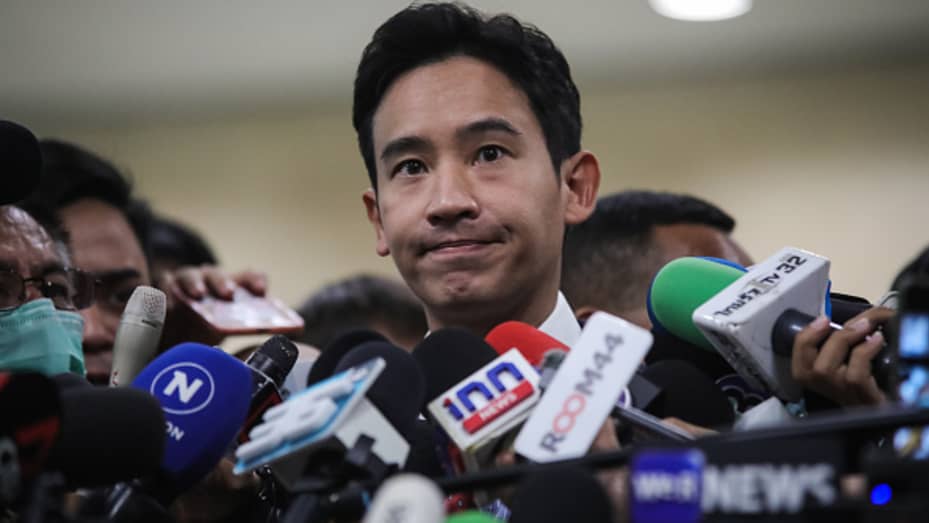BANGKOK, (Reuters) – Thailand’s Constitutional Court today ordered the dissolution of the anti-establishment opposition party Move Forward, ruling its campaign to amend a law that protects the monarchy from criticism risked undermining the democratic system.
The disbanding of Move Forward, which won most seats in the 2023 election, is the latest setback for Thailand’s major political parties, which are embroiled in a two-decade battle for power against a nexus of influential conservatives, old money families and the royalist military.
Though the dissolution could anger millions of young and urban voters who backed Move Forward and its progressive agenda, the impact of the ruling could be minimal, with only its 11 party executives receiving 10-year political bans as a result of the verdict.
Hours after the ruling, Move Forward’s leaders announced the surviving 143 lawmakers would regroup and form a new party on Friday, as they did in 2020, when predecessor Future Forward was dissolved over a campaign funding violation.
Deputy leader Sirikanya Tansakul said the new vehicle, which would be the biggest party in parliament, would take on the same core ideology and would not neglect its promises to the electorate.
“We will not abandon our dream and our mission and duty that was tasked to us,” she said.
“As long as the people are alongside us and support us to change this country, we will continue forward.”
Wednesday’s decision came six months after the same court ordered Move Forward to drop its plan to reform a law on royal insults, ruling it was unconstitutional and undermined the system of governance with the king as head of state.
In a unanimous decision that cited the January ruling, the judges said Move Forward had used the monarchy to gain an election advantage, putting the palace in conflict with the people.
“The action of the accused is therefore an action that may antagonise the democratic system with the king as the head of state,” they said.
King Maha Vajiralongkorn has been on the throne for seven years. The monarch is enshrined in the constitution as being in a position of “revered worship” and the palace is seen by royalists as sacrosanct.
Perceived insults of the monarchy are punishable by up to 15 years in jail.
THREAT TO STATUS QUO
Move Forward’s leaders said the ruling set a dangerous precedent for how the constitution can been interpreted.
They said the party had not antagonised the constitutional monarchy nor did it have any intention of treason, insurrection or separating the monarchy from the country.
Move Forward’s influential rivals last year coalesced to block the party from forming a government, but the progressive movement remains a political force and a threat to the status quo, bent on pursuing a platform that includes military reform and dismantling big business monopolies.
Those policies have put it on a collision course with powerful groups at the heart of an intractable crisis that since 2006 has seen two coups, the removal of four prime ministers, dissolution of multiple parties and crippling, at times violent street protests.
Move Forward is not yet out of the woods, however, with 44 of its current and former politicians, including 26 legislators, the subject of a complaint to an anti-graft body by conservative activists seeking lifetime political bans for seeking to change the royal insults law.
Some supporters called for protests against the court decision. At Move Forward’s headquarters, its loyalists expressed both disappointment and disbelief at the ruling.
“It feels like we have hit rock bottom, truly hit rock bottom,” said Sirinapa Veillet, 58. “It feels like we have no support left, none at all,” she said of Thailand’s democratic institutions.
Move Forward’s disbandment comes at critical juncture in Thai politics, with cracks appearing also in an uneasy truce between the military-backed establishment and another longtime rival, the populist ruling party, Pheu Thai.
Pheu Thai and its previous incarnations have suffered most from Thailand’s coups and judicial interventions, with the Constitutional Court next week set to decide whether to dismiss Prime Minister Srettha Thavisin over his appointment to cabinet of a lawyer who served time in jail. Srettha denies wrongdoing.
Tycoon Srettha’s case is among factors that have heightened political uncertainty and roiled financial markets at a time of weak economic growth, with the prospect of political upheaval ahead if he is removed.
A new premier would need to be voted on by parliament, potentially pitting Pheu Thai against coalition partners and leading to a shakeup of the governing alliance and realignment of cabinet and policies.

